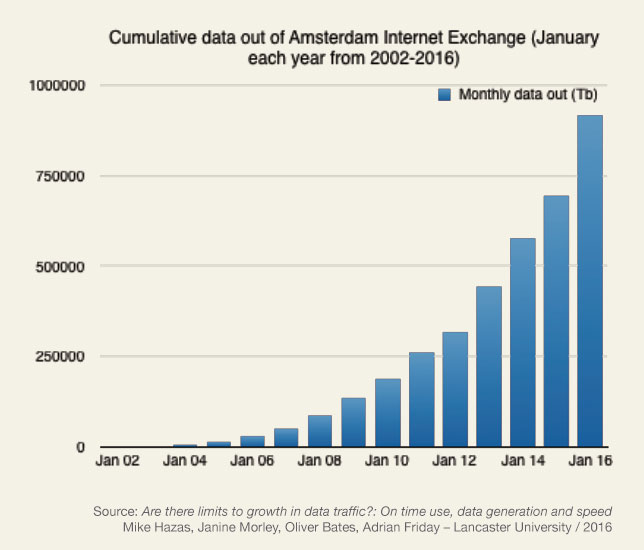

|
||
Researchers from Lancaster University’s School of Computing and Communications have warned that the rapid growth of remote digital sensors and devices connected to the internet—Internet of Things—has the potential to bring unprecedented and, in principle, almost unlimited rises in energy consumed by smart technologies. “In their discussion paper ‘Are there limits to growth in data traffic?: On time use, data generation and speed’, the scientists [Dr Mike Hazas, Dr Janine Morley, Dr Oliver Bates and Professor Adrian Friday] point out that internet usage has increased significantly in recent years with people watching more video, streaming programmes on 4K smart TVs, regularly checking their Facebook and Twitter accounts, and even using online social media to track their runs and bike rides.” http://bit.ly/2aPj3wk
— “This increase in data use has brought with it an associated rise in energy use, despite improvements in energy efficiencies. Current estimates suggest the internet accounts for five per cent of global electricity use but is growing faster, at seven per cent a year, than total global energy consumption at three per cent. Some predictions claim information technologies could account for as much as 20 per cent of total energy use by 2030.”
— Dr Mike Hazas: “The internet is consuming an increasing portion of global electricity supply and this growing consumption is a significant concern in global efforts to reduce carbon emissions… The nature of internet use is changing and forms of growth, such as the Internet of Things, are more disconnected from human activity and time-use. Communication with these devices occurs without observation, interaction and potentially without limit.”
— Limting Data Growth: “The idea for a speed limit to the growth of internet data was originally put forward by Kris de Decker of Low-Tech Magazine. The Lancaster authors point out that it is not clear how data limits could be imposed, but options could include volume quotas and different traffic pricing for the most data-intensive online services.”

Sponsored byDNIB.com

Sponsored byIPv4.Global

Sponsored byRadix

Sponsored byCSC

Sponsored byVerisign

Sponsored byVerisign

Sponsored byWhoisXML API
